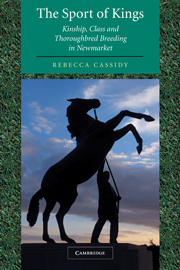6 - Going once, going twice …
Published online by Cambridge University Press: 07 December 2009
Summary
Introduction
The bloodstock market is founded on a central uncertainty. Nobody knows what a good racehorse is, or rather what exactly it is which enables one racehorse to run faster than another. Equally, nobody knows how to set about producing a superior racehorse, or how to select one from a mass of relatively similar yearlings. Every participant formulates his own ideas or theories in the knowledge that they will never guarantee success, nor will any two different theories necessarily be mutually exclusive. This uncertainty is hidden by the myths and rituals of the bloodstock world.
(De Moubray 1987: ⅹⅳ)Before the rhythms of the auction lull the reader into a false sense of security, I should add to Jocelyn de Moubray's ‘central uncertainty’ the fact that racehorses on the whole make very poor investments. Only 40% of racehorses ever win a race. About 17% win two (Potts pers. comm.). In 1999 owners received, on average, 21% of their outlay from prize money (discounting purchase costs). Britain is thirty-ninth (sixth from bottom) in the international league table of world racing nations (Wright 2000: 6). It is against this backdrop of negative equity that public auctions such as the 2000 annual three-day Houghton Sale at Tattersalls in Newmarket are able to net almost 33 million guineas, for 141 lots at an average price of 233,886 guineas per yearling. Obviously, this behaviour requires an explanation.
- Type
- Chapter
- Information
- The Sport of KingsKinship, Class and Thoroughbred Breeding in Newmarket, pp. 88 - 105Publisher: Cambridge University PressPrint publication year: 2002



